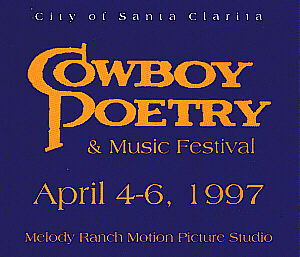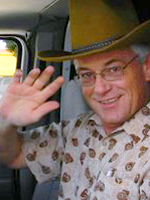Cowboys put the 'Western' into Country-Western
Leon Worden · April 2, 1997
Ken Pulskamp didn't quite know what to expect when a friend invited him to a festival of cowboy poetry and music in central California some years ago.
"Cowboy poetry? What's that?" Santa Clarita's assistant city manager remembers thinking. "It brought up images of people at a rodeo, getting drunk and line dancing. Now I know that was completely wrong."
Don't expect to hear a bunch of rowdy rednecks whining about their achy-breaky hearts this weekend when the annual Santa Clarita Cowboy Poetry and Music Festival rolls into town.
If the "New Country" sound of Garth Brooks is the Country part of Country-Western music, then Cowboy music is the Western part. Cowboy music traces its roots to the earliest campfires on the wide, open prairies. It is sometimes sung, sometimes not, though generally rhymed and metered and recited aloud. It is storytelling at its most refined, a living, breathing history passed down from one generation to the next. It is America's own home-grown version of the oral traditions that survive in many cultures of the world today.
Cowboy poetry and music is the folklore of the West, told and sung by real working ranchers and drovers from California to Colorado. They share stories of the long cattle drives from Texas and Arizona to Idaho and Montana. They sing soft lullabies to the herd to keep it from getting spooked. They talk of loneliness and romance. And even as they break into laughter when the tales get too tall, their strong love and respect for the land shines through.
"A cowboy poem's a photo / Of a life spent on the range / With a philosophy on livin' / Citin' ethics, work and change," coos Waddie Mitchell, one of this year's headliners at Melody Ranch. Mitchell, now 45, left school at 17 to herd cattle in his native Elko, Nevada, where the current cowboy poetry revival began in 1985.
Baxter Black worked on a cattle ranch for 26 years before landing in Councilwoman Jo Anne Darcy's lap (literally) during one uproarious skit last year. Black won't be making the trip this time, but rancher Rod McQueary and his poet wife Sue Wallis will perform on Saturday night, as will Ian Tyson, a working rancher from Alberta, Canada.
What started as a simple gathering of cowboys one cold January weekend in Elko mushroomed into something those early participants probably didn't foresee. This year 150 poetry festivals will be held throughout the Western United States and Canada. When the popular Sons of the San Joaquin arrive in Santa Clarita on Sunday, they will have come off a tour in Alaska two weekends ago and stops in West Virginia and Illinois this week.
To get your hands on an admission ticket, don't call the city. Festival coordinator Michael Marks went nuts about two weeks ago. Instead, get your ticket when you board one of the buses that run every 15 minutes from the 12th Street parking lot on Saturday and Sunday. For directions see the map in today's Old Town Newhall Gazette, inside this newspaper.
And be sure to bring the kids, because they will want to explore the dusty streets and famous Western buildings where so much movie history has been made, and where the rich traditions of the Great American Cowboy still color the soul of Santa Clarita.
Leon Worden is a Santa Clarita resident. His commentary appears on Wednesdays. "Cowboy poetry is a celebration of the cowboy lifestyle, the cowboy philosophy of treating people well," says Pulskamp, whose idea it was to bring cowboy poetry to Santa Clarita in 1994. "All of the good, solid American values come out in the poetry and music -- honesty, loyalty and family values that a lot of people harken for and relate to."
"Cowboy poetry is a celebration of the cowboy lifestyle, the cowboy philosophy of treating people well," says Pulskamp, whose idea it was to bring cowboy poetry to Santa Clarita in 1994. "All of the good, solid American values come out in the poetry and music -- honesty, loyalty and family values that a lot of people harken for and relate to." Shows will be held continuously on three different stages at Melody Ranch, and only one of the venues requires separate tickets. All the rest of the performances, with dozens of professional poets and songwriters, are free with the purchase of a $5 general admission ticket. (Friends of Frank Ferry pay a modest surcharge, but they can afford it.)
Shows will be held continuously on three different stages at Melody Ranch, and only one of the venues requires separate tickets. All the rest of the performances, with dozens of professional poets and songwriters, are free with the purchase of a $5 general admission ticket. (Friends of Frank Ferry pay a modest surcharge, but they can afford it.)
©1997 LEON WORDEN — ALL RIGHTS RESERVED

